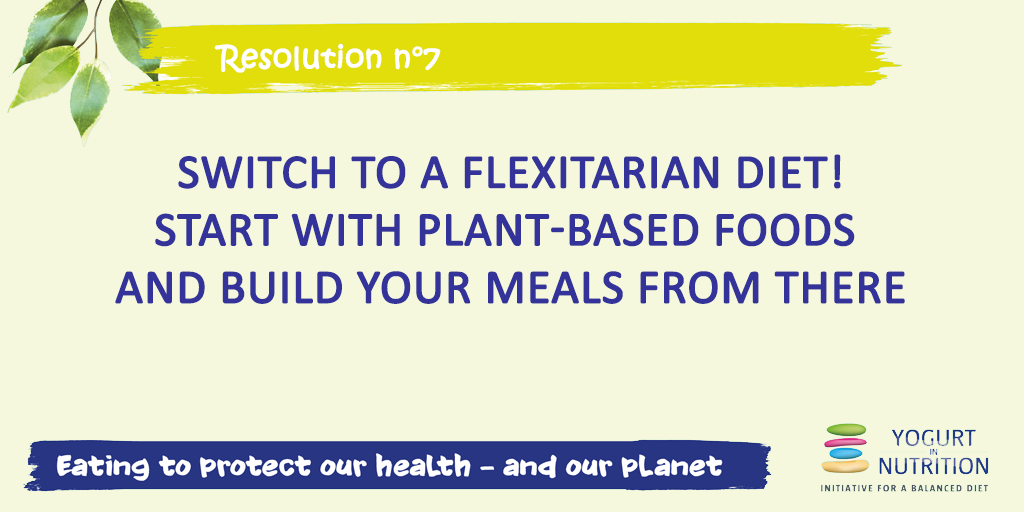At the Yogurt In Nutrition Initiative, we look forward to a more sustainable 2020. Based on all the science we’ve read and the materials we’ve published on the subject, we bring you 12 food re-SOLUTIONS to protect our health and our planet! This month’s resolution: switch to a flexitarian diet.

Switch to a Flexitarian Diet: start with plant-based foods and build a meal from there.
Also known as semi-vegetarian, the flexitarian diet is growing in popularity. Scientists advocate the flexitarian diet as a strategy for eating sustainably without eliminating any food groups. The EAT-Lancet Commission revealed that switching to more plant-rich diets at the global level is likely to result in major benefits both for our own health and the one of our planet.
What is a flexitarian diet or flexitarism?
Flexitarian diets are generally plant-based, containing vegetables, fruits, wholegrain, legumes, nuts and seeds, and low amounts of meat and sugar. Varying amounts of fish and dairy are included. A flexitarian diet encourages variety rather than restriction as you don’t have to exclude any specific food. It’s half a vegetarian diet, based on plant-rich meals, and half an omnivore diet because animal-products are included.
In a world where meat production, mainly beef production, puts the biggest burden on the environment, flexitarian diet can provide a practical solution: this is a realistic way to significantly reduce the amount of meat and animal products without deprivations. Set some small easy goals, for instance go meat-free one day a week. Build you healthy diet habits step by step. While having a meat-free day, you can also reduce portion sizes or opt for more eggs and dairy products.
By switching to a flexitarian diet, we can reverse the sharp rise in our consumption of animal products, especially red meat, mass-produced products, fat, salt and sugar, says FAO & WHO report. In affluent countries, people need to eat less meat for medical reasons and to relieve pressure on the environment. Flexitarian diets are estimated to reduce global greenhouse gas emissions by nearly 50%.
Nutritionally, flexitarian diets hold some advantages over. restrictive diets, which, may lead to deficiencies in vitamin B2 and B12 (provided naturally only by animal products), iron and zinc (from meat), or calcium and iodine (which come largely from dairy products). In flexitarian diets, the large diversity of food groups provides an all-round healthy mix of fiber, high-quality protein, vitamins, minerals and healthy fatty acids such as Omega-3 fatty acid. Maintain dairy products in your diet, they’re a great source of nutrients and their impact on the environment is 5- to 6-times less per gram of protein than beef meat.
For more information, check out our Q&A and infographic about sustainable diets:
- What would a more sustainable diet mean for you ?
- What is a flexitarian diet?
- Infographic: sustainable healthy diets: from science to your plate
Sources:
-
Willett W, Rockström J, Loken B, et al. EAT-Lancet Commission Summary report: Food in the anthropocene: the EAT– Lancet Commission on healthy diets from sustainable food systems. Lancet. 2019;393(10170):447-492.
-
FAO & WHO. Sustainable healthy diets guidelines principles. 2019.
-
WWF France. Towards a low carbon, healthy and affordable diet. 2018.
-
Springmann M, Wiebe K, Mason-D’Croz D, et al. Health and nutritional aspects of sustainable diet strategies and their association with environmental impacts: The Lancet Planetary Health. 2018.
-
Derbyshire EJ. Flexitarian diets and health: a review of the evidence-based literature. 2018.
-
Chen C, Chaudhary A, Mathys A. Dietary change scenarios and implications for environmental, nutrition, human health and economic dimensions of food sustainability. Nutrients. 2019 Apr 16;11(4).



